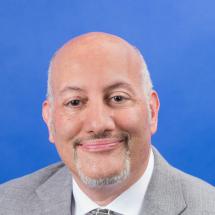Dr. Glenn Flores is a Professor and Chair of Pediatrics, Senior Associate Dean of Child Health, and the George E. Batchelor Endowed Chair in Child Health at the University of Miami Miller School of Medicine, and Physician-in-Chief at Holtz Children’s Hospital in the Jackson Health System. He graduated magna cum laude from Harvard College, and attended medical school at the University of California, San Francisco, School of Medicine. He is a member of the National Advisory Committee (NAC) of the Robert Wood Johnson (RWJ) Amos Medical Faculty Development Program, the Research Committee and DEI Committee of the Association of Medical School Pediatric Department Chairs, and the editorial board of Journal of Health Care for the Poor and Underserved and the. He is a former member of the US Preventive Services Task Force, the Council of the American Pediatric Society, and RWJ Aligning Forces for Quality Program NAC.
Dr. Flores is Director of the NIDDK/APA/PIDS/APS/ABP Research in Academic Pediatrics Initiative on Diversity (RAPID), which is now in its 11th year of NIH funding, and whose goal is to provide career development and advancement for diverse junior faculty clinician-investigators in academic pediatrics. He has provided two Congressional Briefings, US Senate and Congressional testimony, and DHHS and ACF briefings. He has been a consultant/NAC member for the US Surgeon General, IOM/NAM, CDC, NICHD, AMA, NHMA, First Focus, the DHHS Office of Civil Rights, and Sesame Workshop.
Throughout his career, Dr. Flores has been the recipient of several prestigious awards in child health research and advocacy. He has been awarded major grant funding by NICHD, NIDDK, AHRQ, CMS, the RWJ Foundation, and the Commonwealth Fund. He was a member of the Cradle to K Cabinet of Mayor of Minneapolis Betsy Hodges, and the National Advisory Committee of the RWJ Health Opportunity and Equity (HOPE) Measures. He drafted 2018 legislation which was signed into law by Congress and the President as part of CHIP reauthorization which makes organizations that use parent mentors eligible to receive $120 million in CMS grants for Medicaid and CHIP outreach and enrollment. There are now CMS-funded parent-mentor programs in 11 states and the Cherokee Nation. His 259 publications address a wide variety of research and policy issues, including racial/ethnic disparities in children’s health and health care, health equity, health policy, insuring the uninsured, social determinants of health, health services research, public and population health, language barriers in health care, and childhood obesity.
